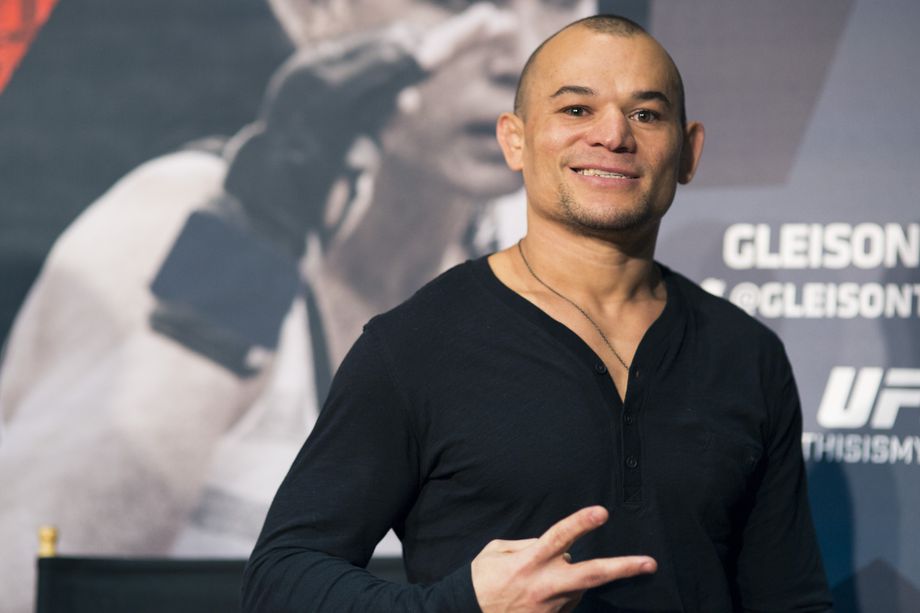
Gleison Tibau will become a free man on Nov. 7, and he had to go through a lot over the past couple of years.
One of the most active fighters in the UFC roster since joining the promotion in 2006, Tibau amassed a record of 16-10 inside the Octagon, but had to stay away from the game for two years after testing positive for erythropoietin (EPO) in and out of competition on Nov. 2015.
The Brazilian lightweight admitted his EPO use in an interview with MMA Fighting back then, and had his first-round submission victory over Abel Trujillo overturned to a loss by the Brazilian MMA Athletic Commission (CABMMA).
Weeks before from being cleared to return, Tibau looks back at the 24 months he stayed away from the game as he prepares to compete later this year.
“After two long years, I’m just waiting for my next fight. The UFC guaranteed me I’ll fight in December, so I’m just waiting,” Tibau told MMA Fighting. “It was the worst two years of my life. Imagine yourself going to the gym every day knowing that you can’t fight for two years.”
Tibau says he tried to look on the bright side of this situation, seeing this two-year suspension as a chance to evolve as a martial artist in the gym instead of taking fights, and entering one training camp after the other, but admits that he thought about ending his MMA career for good.
“I didn’t sleep well several times,” Tibau said. “Money became a problem. Fighters only make money when they are competing, but bills won’t stop coming. Months and months without fights, that disturbed me. That really disturbed me. I thought about doing something else, following a different path. A lot of things crossed my mind.
“Not making any money for two years was bad, but I also worried about being outdated when I came back to the sport. Training with the best at the gym changed my mind in that aspect, but finances were a big issue because fighters only make money when they fight.”
Tibau tried to teach some seminars right after the suspension, but the money wasn’t worthy. He had just done some investments in his hometown, starting a cookie factory in Brazil, when the suspension came and forced him to change plans.
The 34-year-old veteran has made good money competing 27 times under the UFC banner, and being smart about his finances is the reason why he was able to pay his bills over the past couple of years.
“I always wanted to make sure that my daughter would have a comfortable and safe life, so I saved money throughout my career,” he said. “I always did that. If it wasn’t for that, I’d definitely have to find another job otherwise. There was no way we could make a living.”
It’s been almost three years since Tibau’s last UFC win, a split decision over Norman Parke, and he’s confident that his positive test for EPO was an alert to other MMA fighters.
“I have my soul and head cool,” he said when asked about regrets of taking EPO. “It’s a substance that no UFC athlete will point a finger at me and say anything because everyone else used it. I’m 100 percent sure everyone else used it. I was the first fighter to get caught with this new USADA rule. I was misinformed that this substance wasn’t allowed with USADA. I needed it because my tests showed I had low red blood cells, so I needed that to get better.”
Tibau has competed against some of the best fighters in the UFC over the past decade, including Nick Diaz, Tony Ferguson, Khabib Nurmagomedov and Rafael dos Anjos, and doesn’t rule out competing in multiple weight classes in the future.
“I’ll be ready to fight at 170 or at 155,” said Tibau, who fought at welterweight for the last time at UFC 65, losing to Nick Diaz. “I used to take fights on short notice and suffer a lot to cut weight. I won’t do such crazy thing anymore. I want to fight to win, to be at my best all the time. If the UFC offers me fights on one or two weeks’ notice, it has to be at 170. If they give me a full camp, I’ll fight at 155.”





More News
UFC269: Venezuelan Julianna Peña Submits Brazilian Amanda Nunes, Becomes the new UFC World Champion
Oliveira, Poitier Make Weight for UFC World Title
Hot UFC269: this Saturday Oliveira vs Poirier Ready for War in Las Vegas